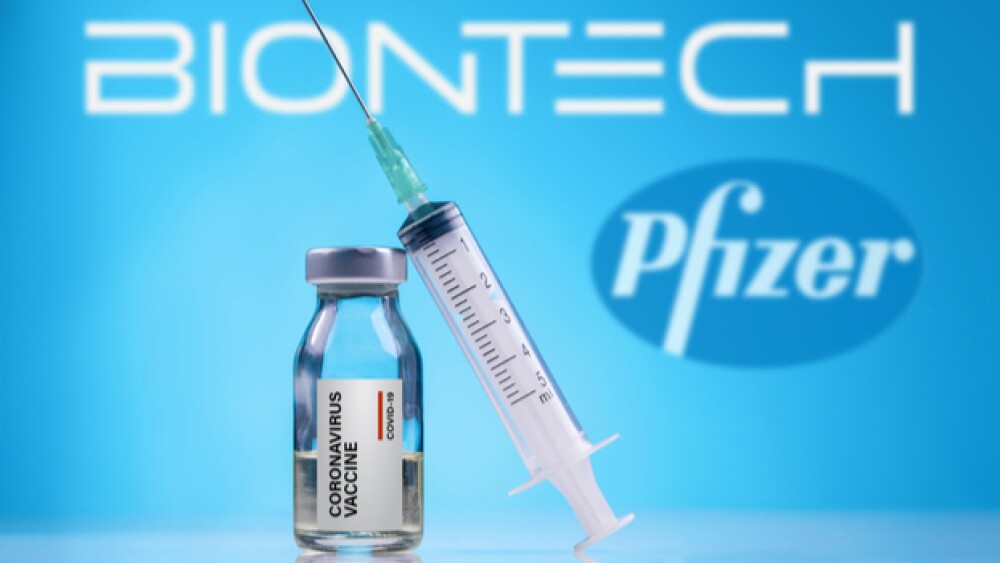BioNTech announced it is partnering with Pfizer to begin testing a next-generation universal vaccine against coronaviruses, including SARS-CoV-2, the coronavirus that causes COVID-19.
Courtesy of Yalcin Sonat/Getty Images
At its investor day on Wednesday, Germany’s BioNTech presented what it called its “Innovation Series 2022.” Although much of the presentation was dedicated to the company’s broad R&D programs, one of the most immediately newsworthy items was its plan with Pfizer to begin testing a next-generation universal vaccine against coronaviruses, including SARS-CoV-2, the coronavirus that causes COVID-19.
Progress Against Omicron
On Monday, the two companies reported positive data on two Omicron-adapted COVID-19 vaccine candidates. One is bivalent, a combination of the original COVID-19 vaccine and a second that targets the Omicron BA.1 variant of concern, while one is just the Omicron-targeting vaccine. Data from a Phase II/III trial studying a booster of either vaccine resulted in a substantially higher immune response across Omicron BA.1 than their original vaccine.
The partners are also working together on other infectious disease-related vaccines, including a Phase I trial launching in the second half of this year for a shingles vaccine and an update is expected on a quadrivalent mRNA vaccine against influenza.
In addition to vaccines against COVID-19, influenza and shingles, BioNTech indicated it is exploring trans-amplifying RNA (taRNA) and self-amplifying RNA (saRNA) in multiple other infectious diseases, including HIV, Ebola virus, Lassa virus, Marburg virus, Crimean-Congo hemorrhagic fever virus (CCHFV), Nipah virus and MERS-CoV.
BioNTech is More than Just COVID-19
The company is also shifting some of its resources to focus on antibiotic-resistant bacterial infections. BioNTech indicated this was, in part, to continue to boost its infectious disease business. It acquired PhagoMed in October 2021 to leverage its expertise in this area.
BioNTech has come a long way in the last two-and-a-half years and wants to make sure its success continues past its partnership with Pfizer on the original COVID-19 vaccine. It currently has a diversified pipeline across four drug classes with 21 ongoing clinical trials and 17 product candidates in clinical development. It also boasts partnerships with Genentech (Roche), Genmab, Regeneron, Fosun, Sanofi, Crescendo, Medigene, InstaDeep, TRON, BMGF, UPenn and multiple not-for-profit organizations.
In addition to its R&D, BioNTech is diversifying its GMP manufacturing infrastructure, with two state-of-the-art cGMP cell therapy sites and global commercial scale mRNA production capabilities. The company touts end-to-end mRNA production capabilities and a combined 100,000 square feet of manufacturing space, with a total capacity of more than 1 billion doses of the COVID-19 vaccine and enough flexibility to support a broad range of mRNA therapies. It expects to have a new site in Singapore in 2023 and is building a site in Rwanda, with new sites planned for Senegal and South Africa.
The company’s mid-term goals include multiple product launches in the next three to five years and five to 10 Investigational New Drug (IND) application submissions per year.
Leveraging mRNA Against Cancer
Because of its COVID-19 vaccine and other infectious disease programs, it’s easy to forget that BioNTech has big ambitions for leveraging mRNA and other technologies into cancer. In early June, at the American Society of Clinical Oncology (ASCO) annual meeting, Vinod Balachandran, M.D. of Memorial Sloan Kettering Cancer Center presented preliminary Phase I data about BNT122, which the company is evaluating with Genentech as a treatment for pancreatic cancer.
The product is an mRNA-based individualized neoantigen-specific immunotherapy (iNeST) autogene cevumeran in combination with Genentech’s Tecentriq (atezolizumab), an anti-PD-L1 immune checkpoint inhibitor. The patients in the trial have resected pancreatic ductal adenocarcinoma (PDAC). Early data demonstrated a favorable safety profile and encouraging indications of clinical activity. BNT122 is being developed for multiple solid tumors.
In its presentation, BioNTech reported that across its trials for iNeST vaccination, it had screened more than 1,400 patients with 28 different cancer indications, treated more than 420 patients, selected more than 122,500 neoantigens and processed about 1,700 tumor samples.
iNeST immunotherapies are individualized cancer treatments that target the patient’s unique tumor. They hold unmodified, pharmacologically optimized mRNA that codes for up to 20 patient-specific neoantigens. Neoantigens are proteins produced by cancer cells that are different from proteins manufactured by healthy cells. The mRNA is then inserted into BioNTech’s proprietary intravenous RNA-lipoplex delivery formulation.
In addition to iNeST individualized cancer vaccines, BioNTech is focused on off-the-shelf cancer vaccines. Its gene and cell therapies include CAR T products, individualized TCR therapies, polyspecific T-cell therapies and in vivo engineered cell therapies, as well as next-generation immunomodulators, such as immune checkpoint molecules and engineered bispecific antibodies.





